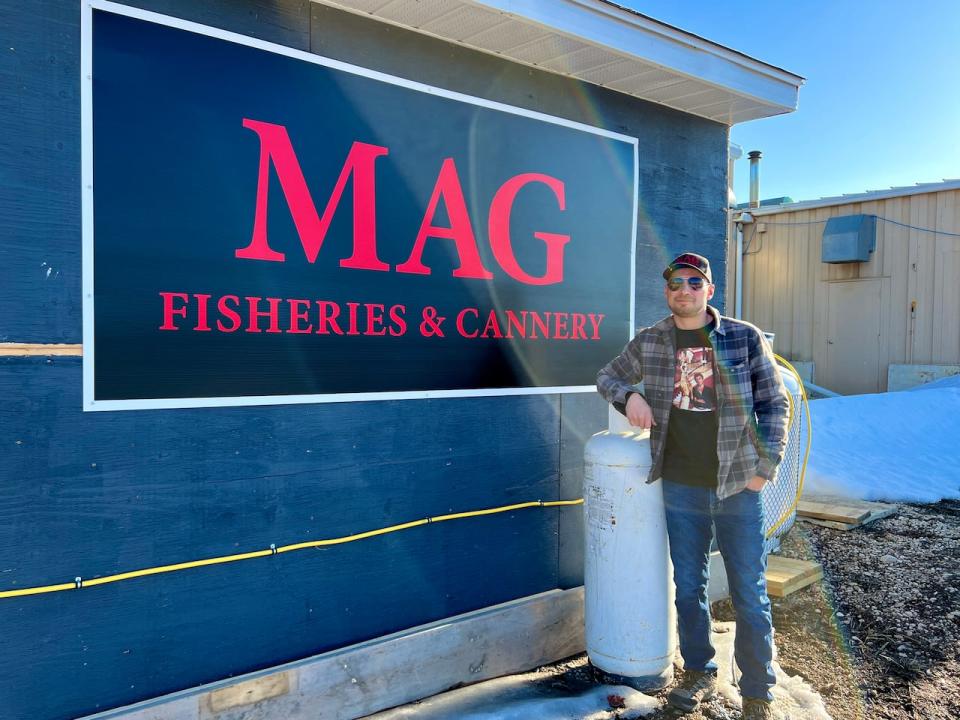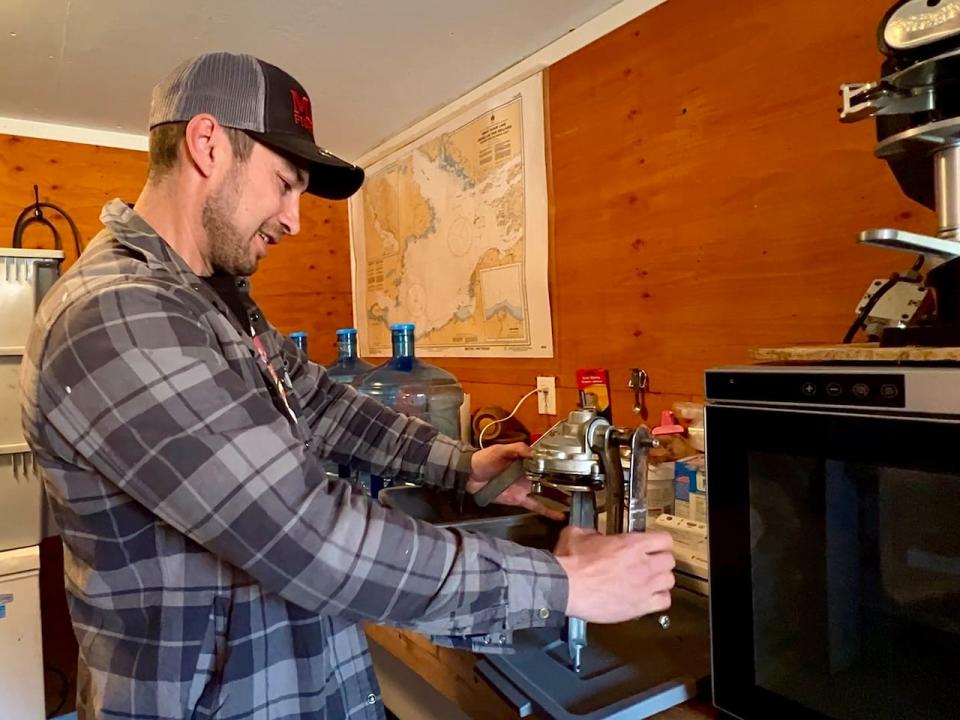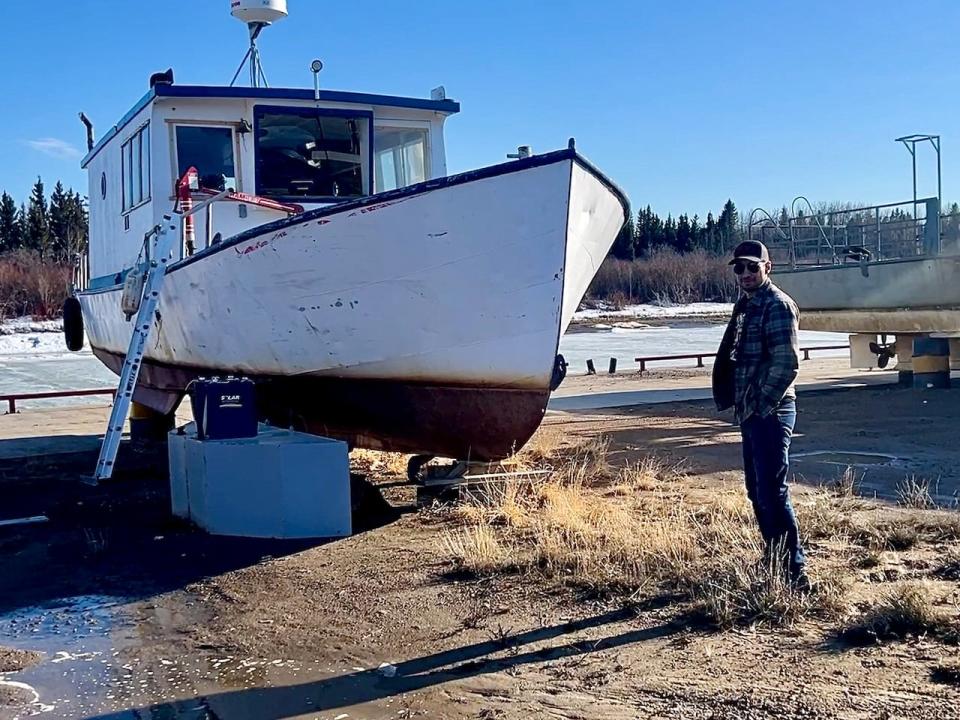N.W.T. fisher says DFO officers are going overboard with enforcement tactics

A commercial fisherman in Hay River, N.W.T., is voicing concerns about what he views as harassing and confusing enforcement practices by Fisheries and Oceans Canada (DFO).
Aaron Campbell is relatively new to commercial fishing and saw it as an opportunity to help revitalize the industry and contribute to the local economy.
Campbell works at Diavik Diamond Mine full-time but wanted a hobby for his days off. He started commercial fishing a year ago, selling canned and smoked fish from Great Slave Lake. He hopes to see the business grow into a full-time career.
But after a couple of encounters with DFO officers he's feeling uneasy about his new venture. Campbell said it all started when he was recently approached by a plain-clothed man who only later identified himself as a DFO officer. The man initially asked about buying fish off Campbell.
"Then he kind of switched the subject to fish guts," Campbell said. "He said that somebody said we were dumping fish guts into the wharf, which I actually didn't know we weren't allowed to do."
Campbell said he was accused of improperly disposing of the fish waste. The issue was resolved after he was informed of the rules by the DFO officer.
Now, Campbell says he was told by the DFO that there is an open investigation pertaining to his log book. He says he only found out about it after the investigation was opened.

Campbell in front of MAG Fisheries & Cannery, a business he and others started in Hay River. He would like to see the business grow into a full-time career for him. (Carla Ulrich/CBC)
It's not clear what prompted the investigation, what its scope is, or what it might mean for Campbell — but he feels it's unwarranted.
"It's my first year fishing. If I'm doing something wrong, just let me know then I'll stop," he said.
Ensuring compliance 'objectively, professionally, and with respect'
In an emailed statement to CBC News, a DFO spokesperson said they could not discuss specifics regarding the active investigation related to Campbell.
They also said that fisheries officers have the difficult job of enforcing the Fisheries Act, and that when violations are found it is the responsibility of DFO officers to investigate.
"Their role is to monitor fishing activity to ensure compliance with the Fisheries Act objectively, professionally, and with respect," they said.
The spokesperson described using a progressive approach to enforcement, focusing on education before issuing warnings, launching investigations, or laying charges. They also said they strive for consistency in enforcement, across all regions.
But Campbell wants to know why he wasn't contacted by an officer before an investigation was opened into his operation, and why no warnings were issued — a practice he was told was standard before an investigation.
'I'm trying to bring jobs to the N.W.T.'
Campbell believes increased scrutiny, harsh penalties, and over-policing have created an environment of fear and frustration among many local fishers, who feel they are being unfairly targeted by the DFO.
He said it's particularly difficult for those who don't have other work, like he does.
"I understand why all the other fishermen are nervous around these guys. That's their source of income. That's how they pay their mortgage, that's how they pay their truck payments, that's how they buy their kids shoes, put food on the table. That's not the case with me," he said.
Campbell also says DFO's efforts seem to be at odds with the territorial government's efforts to revitalize the local fishing industry. Campbell and many other fishers have benefited from subsidies and training programs aimed at encouraging new fishermen.

Campbell inside MAG Fisheries & Cannery with a manual can-sealer. (Carla Ulrich/CBC)
"We're trying to revitalize the fishing industry," he said. "And the DFO is trying to do the opposite.
"I'm trying to bring jobs to the N.W.T. I'm trying to keep our product here so we can keep as much of the money in the territory [as possible]."
Campbell feels DFO's approach to enforcement will discourage others from trying to navigate the complex regulations.
"It's discouraging, not just for me but for anyone who's thinking of starting out," Campbell said.
Campbell said fellow commercial fishers have expressed similar concerns about DFO's enforcement, particularly in recent years.
Cameron Beaverbones, a commercial fisher in Hay River, says that he's had several minor infractions lead to what he feels are severe consequences. He describes a significant change in DFO's approach in recent years, from focusing on educating fishers, to intimidating them.

Campbell in front of his primary fishing boat. He received help from the N.W.T.'s Department of Industry, Tourism and Investments to purchase the boat. (Carla Ulrich/CBC)
"I've been fishing for over a decade, and the last few years have been the hardest," Beaverbones said.
He said he's been investigated for not adding "p.m." to a time in his logbook, and was later charged. He said he pleaded guilty to avoid expensive legal costs and a lengthy trial.
He's concerned about other fishers being charged for similar things, particularly those who are elderly or struggle with literacy.
"Some people don't know how to read or write, and now they're facing fines for logbook mistakes," he said.
"It used to be about helping us understand the rules. Now, it feels like they're just waiting for us to make a mistake."


